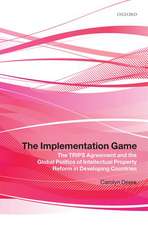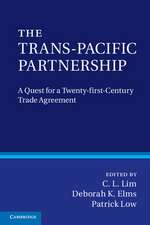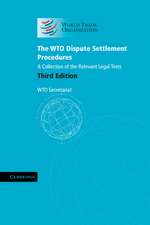Opening Markets for Foreign Skills: How Can the WTO Help?: Lessons from the EU and Uganda's Regional Services Deals
Autor Joy Kategekwaen Limba Engleză Hardback – 18 mar 2014
| Toate formatele și edițiile | Preț | Express |
|---|---|---|
| Paperback (1) | 558.62 lei 38-44 zile | |
| Springer International Publishing – 23 aug 2016 | 558.62 lei 38-44 zile | |
| Hardback (1) | 645.47 lei 43-57 zile | |
| Springer International Publishing – 18 mar 2014 | 645.47 lei 43-57 zile |
Preț: 645.47 lei
Preț vechi: 759.37 lei
-15% Nou
Puncte Express: 968
Preț estimativ în valută:
123.51€ • 129.30$ • 102.20£
123.51€ • 129.30$ • 102.20£
Carte tipărită la comandă
Livrare economică 07-21 aprilie
Preluare comenzi: 021 569.72.76
Specificații
ISBN-13: 9783319035475
ISBN-10: 3319035479
Pagini: 272
Ilustrații: X, 260 p. 9 illus.
Dimensiuni: 155 x 235 x 22 mm
Greutate: 0.56 kg
Ediția:2014
Editura: Springer International Publishing
Colecția Springer
Locul publicării:Cham, Switzerland
ISBN-10: 3319035479
Pagini: 272
Ilustrații: X, 260 p. 9 illus.
Dimensiuni: 155 x 235 x 22 mm
Greutate: 0.56 kg
Ediția:2014
Editura: Springer International Publishing
Colecția Springer
Locul publicării:Cham, Switzerland
Public țintă
ResearchCuprins
Introduction.- Conceptual Issues.- The Economic Importance of Mode 4.- Character and Trends in Existing Mode 4 Commitments in the GATS.- A Case Study of the EU Schedule of Specific Commitments.- A Case Study of Uganda's Schedule of Specific Commitments on Mode 4 in the GATS.- Prospects for Change in the DDA.
Notă biografică
Dr. Joy Kategekwa is a Ugandan international trade and investment law specialist currently working with the World Trade Organization's development division- where she focuses on special and differential treatment negotiations and African issues in the DDA. Before joining the WTO, she worked with Oxfam International's Geneva Office as a Trade Policy Advisor and before that, with the South Centre as a Program Officer on Trade in Services. In both roles, she was responsible for providing technical negotiation support to LDCs and developing countries in, inter alia, the GATS Mode 4 negotiations. Prior to that, she represented her country in the WTO's Doha negotiations; notably in the areas of services, intellectual property and special and differential treatment. Her research interests are in the development aspects of WTO law and in trade in services: the latter being the subject of several of her publications. Dr Kategekwa approaches this research with the advantage of a practitioner's perspective.
Textul de pe ultima copertă
The Mode 4 commitments of WTO Members are narrow and shallow. Even though trade negotiations for enhanced Mode 4 access started well before the launch of the DDA- prospects for success are thin. These negotiations followed a traditional mercantilist approach- with limited attention to the underlying difficulties countries face in letting people into their borders, either generally, or on the basis of a WTO GATS commitment. This Book argues that this approach alone will not succeed. It proposes a focus not on trading market access concessions only, but on discussions aimed at understanding each other's regulatory approaches. To date, in terms of the literature available, we know very little about how WTO Members are managing their Mode 4 commitments. We know even less about how the WTO could learn from clearly more advanced steps in regional liberalization processes. This Book addresses these issues- through case studies of market access and national treatment commitments, and regulatory approaches in Economic Integration Agreements of a select group of WTO Members.
Caracteristici
An easy to read, user friendly resource guide to understanding WTO Law on Trade in Services in general and Mode 4 in particular A special chapter on the next frontier in WTO engagement on labor mobility A resource guide on best practices in regulating labor mobility in the WTO context













